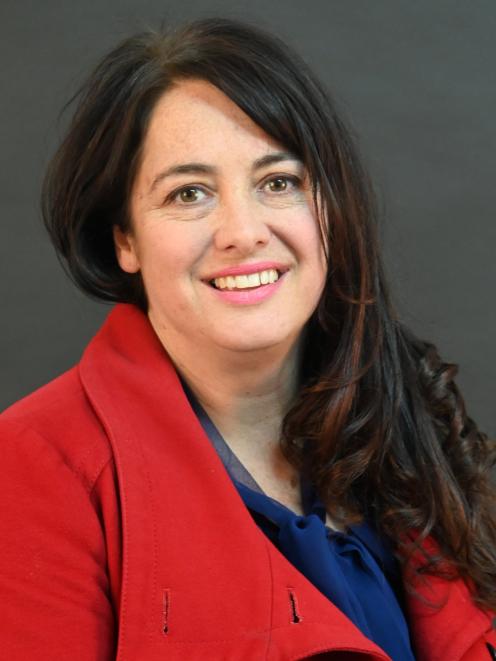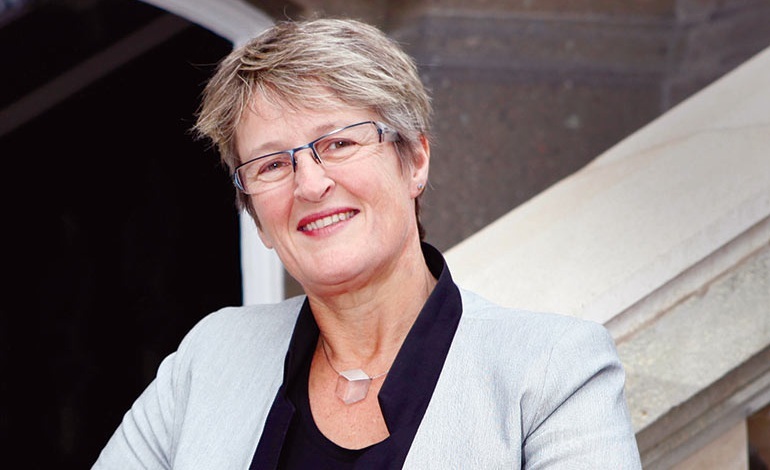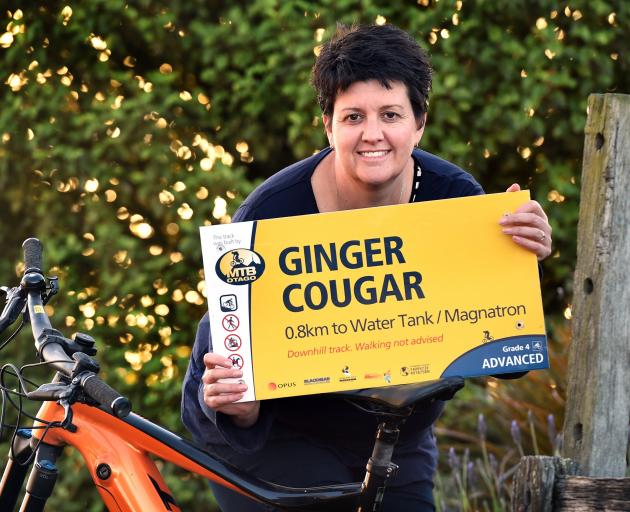Chief executive Sue Bidrose manages with gusto as she helps steer Dunedin City Council through troubled waters. By Ruth Le Pla
Sue Bidrose reminds me of my favourite
sister-in-law. I’ve got eight of them so it’s more than my life’s worth
to let the other seven know who tops the list. Suffice it to say, Sue’s
the one with the most intellectual, emotional and funny smarts. She’s
got them all in bucket loads.
“I’ve been looking at your LinkedIn
profile,” I start, innocuously, in a mild ice-breaking kind of way. “Oh,
blimey!,” she says, as though I’d said something amazing and daringly
dangerous. And off we go: her life a rollicking good tale of wanting to
draw Antarctic plankton for a living, going walkabout in Africa and
managing with old-fashioned honest gusto.
I’d already spotted Local Government
Magazine placed conspicuously on top of a pile of other magazines on my
way into her office. I’m still not sure if that was stage-managed for my
benefit or − as editors like to imagine − the world is chock-full of
organisations displaying their work. Still, it was a friendly precursor
to the warm welcome I receive. For Sue fair bounces across the room to
greet me and there’s no let-up in the conversation.
Maybe her knack of putting people at
ease stems from her background as a psychologist, counsellor and
mediator. In any case, she readily admits she tries to unlock issues by
focusing on what makes individuals tick.
“You know the saying, ‘if you’ve only
got a hammer then everything looks like a nail’? There’s some truth in
that,” she says. “For me, everything is a people problem.”
Sue reckons some of the best advice for a
local government CE is to keep a personal perspective in any dispute,
problem or complaint. That holds equally true when working with
councillors, community and fellow council officers, she says.
I’d hazard a guess that her positive
focus on people has been a handy tool ever since she first sat down in
the CE’s chair in November 2013. For within a few weeks of taking over
from former CE Paul Orders she set in train a process that unearthed a
historic fraud at the council that has dominated publicity about her
tenure ever since.
“Paul had spent a lot of time focusing
on the financial position of the council, the CCOs and the [Forsyth
Barr] stadium,” she says. “As he left he said to me, ‘now your work
begins on the council itself − there’s a lot of systems and process work
here that’s needed’.”
SYSTEMS
Sue started to tackle legacy systems
that had lumped responsibilities together. One person, for instance, had
responsibility for purchasing, selling, insuring and keeping the asset
register and there weren’t the appropriate checks and balances in place,
she says.
“And we didn’t have a centralised
contracts database, for example, which meant we had instances where
members of staff were rolling over contracts outside of their delegated
authority and nobody knew.”
She got the ball rolling and sat down
with new chief financial officer Grant McKenzie to work through a list
of the processes in most urgent need of attention.
“When he asked for an independent
assessment in some of the areas of separation of duties,” she says,
“that’s how we uncovered the fraud.”
In May last year vehicle fleet unit team
leader Brent Bachop died suddenly, his death referred to the coroner.
Three days later Dunedin City Council engaged Deloitte to investigate
what appeared to be a discrepancy in the number of its Citifleet
vehicles.
At its heart was an alleged fraud
totalling more than $1.5 million and centering on the council receiving
no proceeds from the sale of 152 of its fleet vehicles. The alleged
fraud dated back more than a decade.
The matter escalated in August when,
after Deloitte completed its review, a formal complaint was laid with
the police who were asked to investigate any matters arising from the
report.
And for many months, Sue was caught
between public and media cries for more information and a request by
police not to release the Deloitte report until they had completed their
own investigations.
That’s since been resolved: a redacted
version of the Deloitte Dunedin City Council Project Lewis –
Investigation Report going public in the last few working days before
Christmas.
In a press statement outlining the
Deloitte report, Sue says it’s clear that a “single person committed the
fraud in a number of different ways over an extended period of time”.
Dunedin Clutha Waitaki area commander
inspector Jason Guthrie says the police investigation will be subject to
a final review early this year.
Sue says she lost sleep on quite a
number of occasions over the whole episode. A Southland Times “scoop”
calling on her to resign was “pretty hard” to take.
“When you’ve got a new chief executive
and they uncover a 10- or 20-year-old fraud within several weeks of
taking on the job you generally pat them on the shoulder,” she says.
“You don’t usually ask them to quit.
“That lost me some sleep in terms of my
own personal reputation. But all you can do when you’re a CE is you know
people are going to throw eggs and you’ve got to act with your own
integrity. And that carries me through quite well. It’s about having a
public service ethical compass and I’m comfortable with where mine
points.”
ACTION
Practically, for much of last year she’s
been facing down the issue on two fronts – first, by looking at both
cultural and leadership initiatives designed to clarify what is and
isn’t okay, and, second, enshrining a series of new checks and balances
into council processes.
The cultural stuff includes everything
from how officers should handle any gifts they may be offered and
(former) perks such as cheap entry to council swimming pools or
discounts at art gallery shops. And there are much clearer rules, for
example, about when someone can or cannot take a council vehicle home.
She talked it all through with the
Auditor-General and the new guidelines are based on the way they and
central government departments deal with these issues.
“There are a lot of these changes
underway. Some of this is around our attitude to perks and public
service ethic and what it means when you’re spending someone else’s
money.”
The checks and balances tighten up items
such as council’s contracts and interests registers, declarations of
interest, and the formal processes around separation of duties and cash
handling.
“Look, the vast bulk of my staff are fantastic,” says Sue, “but it’s about all of us just being a little bit more aware.”
As far as possible, she’s also tried to
front-foot and share her learnings on how to create a fraud-resistant
council: among other activities speaking at SOLGM’s mid-year CEOs’ forum
and at the group’s annual summit which was held on her home turf of
Dunedin at the end of last year.
Most of the staff are now on board with the changes, she says, which is a useful measure of success.
Nevertheless, it’s been a hard year for
Dunedin City Council. “The fraud, and the ripples from it, has made it
so difficult for a lot of people,” she says.
“The parking wardens get a hard time
from members of the public saying, ‘ah, I bet you nicked a car’ or the
building consent people get teased about it. We’re all over it. I’m over
it. We’re all over being teased about whether we stole a car. It’s
bloody awful.”
FINANCES
I can’t help wondering how different our
conversation would have been if there hadn’t been any fraud allegations
for her to unearth and how she might have been better remembered for
her other work last year.
She’s proud that, for the first time in
more than a dozen years, last financial year council paid off more debt
than it took on. And that’s right across the entire council family,
including all CCOs as a whole, the much-debated Forsyth Barr Stadium and
council itself.
The driving force behind that, she says, was a lot of “bloody hard work” that started at the time she first got there.
“The first thing I did was go through
[the finances] and say ‘we’re gonna run into trouble, we can’t keep
having the rates rises, we need to take out all the discretionary capex
and we need to have a conversation with our community to say ‘okay we’ve
done some fabulous things, done a wonderful redesign of the town hall,
we’ve built Toitu- Otago Settlers Museum, we’ve got a fantastic $100
million wastewater treatment, we’ve got the stadium… actually, now is
the time to pay the bill.’
“We need to get ourselves in hand, stop
having eight/nine/10 percent rates rising because the community is at
the end of its limit and we need to live within our means. But at the
same time we’ve got to create a city that’s vibrant and that people want
to live in.”
She says she’s neither particularly
egocentric nor especially ambitious. Other people have described her as
“fair but no-nonsense” and say she’s well-regarded in local government
circles. Sue says she’d be proud to have been called either of those
things.
“Wally, who was my head of marketing in
my last council used to call me an iron fist in a velvet glove. I’m
quite comfortable with that because I’m really clear on issues like
public service ethic – there’s no grey line for me. Undermining a
councillor, or a council wish, is always a no-no for me. Always.”
And the velvet glove, bit? “That’s
always about the people. We’re all flawed individuals doing our best and
people make mistakes.”
And that, she says, is understandable as
long as you’re then prepared to look at what you’ve done wrong, work
out how not to do it again and put it right.
She says she’s “no kind of oracle” with a
particular message to impart to the wider world of local government.
Then she encourages others to revel in the “joy and privilege” of
working with a great group of elected people.
“You might not always agree with them
but they’re the ones who’ve been picked to represent that community by
that community and – whether you individually like them or not − you owe
them your respect and allegiance. That’s the lovely part of the job.
That’s the exciting part for me.”
Find out more
To read a redacted copy of Deloitte’s Dunedin City Council Project Lewis – Investigation Report go to www.dunedin.govt.nz/deloittereport. Some parts of this report have been changed for privacy reasons.




